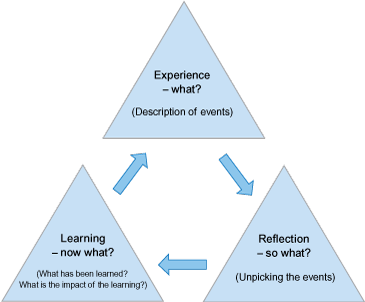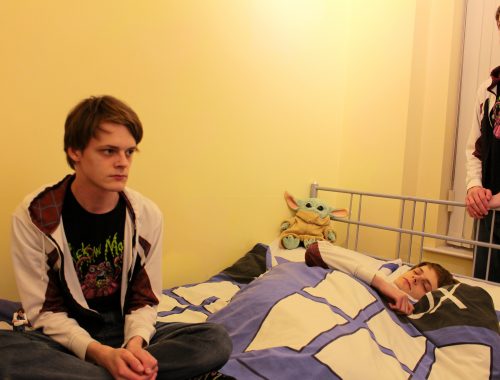Putting Yourself Out There
Applying for a job, it’s something everyone must do at some point in their lives. There are book on it, videos on it, even courses about it, yet the process doesn’t get any less daunting. When I was applying for work placement there were many nuances that I learned about the application process that aren’t necessarily common knowledge, but when you think about them make a lot of sense. Using Boud et al’s Model of self-reflection I am going to outline my experiences and what I learned from them, to help you get a head start in your job applications.

My Application Experience
While I was applying for my work placement for university the world was still mostly in lockdown, offices were closed with people working from home ‘The Internet is fast becoming the place for recruiters’ (Clarke, P14), and I was back home on a completely different island to my potential work placements. Not ideal but it simply meant I had to embrace the online application process of the modern world and learn the joys and horrors of emails. I started out sending only a few emails out at a time, waiting for a response before I sent out another batch. Quickly learnt that I would be waiting a very long time using this strategy and decided to cast a wide net, sending a cover letter with my CV to anyone and everyone I might be interested in working for. I only very slightly changed my CV for each new application, all the jobs were in the same creative arts field and at 21 I still have the dilemma of needing experience to put on my CV to help me get more experience to put on my CV. Then came the waiting, a few were kind enough to send me an email letting me know there office still wasn’t open due to Covid or that the role had already been filled, others chose to send no email leaving it up to me to decide whether my email had just been lost or that they just weren’t interested. One was extremely nice and actually called me back after my email to let me down easy but offered to keep my CV on record in case anything appeared. Then, finally, I got my email from ProfileTree offering me a placement while also embarrassingly pointing out I had accidently applied for two different placements in my email to them.

After a brief back and forth, showing them some of my previous work and clarifying which placement I wanted I secured my placement. And with that I could relax back in my chair, not so hard, was it?
What the Hell Happened?
So, looking back what should I have done differently? First issue was emailing! Emails are a dime a dozen especially with remote working now a workplace staple, and they are extremely easy to miss, ignore or loose! I would recommend calling anywhere you can when applying for a job, harder to miss or ignore. It may seem pushy but gets you noticed and lets you know if even still available rather than waiting two weeks to get an email back saying the placement was filled already. Their time is valuable but so is yours!
After this sending a cover letter and your CV, ‘your CV is the primary weapon in your armoury’ (Jones, P19), often this is what makes up an employers mind on whether to hire you or not.
Speaking of which I definitely should have changed my CV more between applications, while I am still young and have the struggle of needing experience to get experience, I worried by changing or removing too much would make my CV look barren. However, ‘you must be ruthless in weeding out any unnecessary information’ (Corfield, p19), a lean and fierce CV is much better than one packed with filler.
One other thing I overlooked was the field I was applying into, the creative arts near always requires examples of your work, I had this in the form of past short films I made on my YouTube channel, a link to which is on my CV. The issue with this is like my CV my show reel should be tailored to my job application which is impossible to do when simply handing out links to my YouTube channel.
Finally, always, always, ALWAYS, double check everything! Luckily with my final application it didn’t matter but small mistakes like applying for two positions or spelling errors don’t make good first impressions and likely lead to your emails not getting a response. My grandad had a phrase he liked to teach to me for exams “Read the question, read the question and read the damn question!”.
What Now?
Looking back over this experience I have learnt a lot about applying for jobs. I have now created a master CV and show reel with all my experience, education, hobbies, and interests that I can hack and slash at until only what is relevant for the job remains which is highly useful. When I was applying for my part time job, I applied to many places at once as well as called rather than emailed, which has led to a lot faster responses no. And while I can’t be sure no mistakes have been missed, I make sure to read everything twice before sending to be as sure as I can be.
These tips and tricks are sure to come in handy later in life, all that is left now is to learn how to do the job.
References
OpenLearn. Boud Et Al’s Model Of Self Reflection. https://www.open.edu/openlearn/ocw/mod/oucontent/view.php?id=51386§ion=4. Accessed 17 Nov 2021.
Profile Tree. Profiletree Logo. https://profiletree.com/. Accessed 20 Nov 2021.
Bibliography
Chivers, Barbara, and Michael Shoolbred. A Student’s Guide To Presentations. SAGE Publications Ltd, 2014.
Clarke, John. The Right Way To Write Your Own CV. Right Way, 2001, p. 14.
Corfield, R. (1999) Preparing your own CV: how to improve your chances of getting the job you want P19
Dawes, Graham, and Ian Cunningham. The Handbook Of Work-Based Learning. Gower Publishing Limited, 2004.
Done, Judith. Brilliant Graduate Career Handbook. Pearson, 2016.
Ellis, R. T. Interview Skills: From Both Sides Of The Fence. Creatspace Independent Publishing Platform, 2015.
Fanthome, Christine. Work Placements – A Survival Guide For Students. Macmillan Education, Limited, 2004.
Herbert, Ian, and Andrew Rothwell. Managing Your Placement: A Skills-Based Approach. Palgrave Macmillan, 2005.
Jones, Alan. How To Write A Winning CV: A Simple Step-By-Step Guide To Creating The Perfect CV. Century, 1996, p. 19.
Rogers, Howard. Writing Your C.V: Conducting A Successful Interview. Easyway Guides, 1997.
Rook, Steve. The Graduate Career Guidebook. Red Glode Press, 2019.
Yate, Martin John. Great Answers To Tough Interview Questions. Kogan Page, 2014.
You May Also Like

AAAH or (Why Tom sucks at selling himself)
25 November 2021
First Day Fears
24 November 2021

